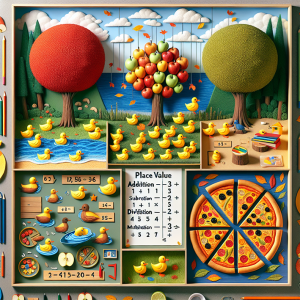Arithmetic
Arithmetic in mathematics encompasses various fundamental concepts related to numerical values and mathematical operations. It includes topics such as place value, addition, subtraction, multiplication, division, fractions, decimals, and more. Students learn to understand the meaning of numbers, how to manipulate them using different operations, and how they relate to one another. Mastery of number and operations is crucial as it forms the basis for more advanced mathematical skills and problem-solving. This section helps students develop a strong foundation in arithmetic and numerical reasoning, which are essential for success in higher-level math courses.
Geometry
Geometry is the branch of maths that deals with shapes, sizes, and positions of figures. It explores points, lines, angles, surfaces, and solids, and how they relate to each other in space. Imagine drawing shapes on paper – that’s a basic form of geometry. Learning geometry helps us understand the world around us, from the layout of our streets to the design of buildings and bridges. It improves spatial reasoning, problem-solving skills, and logical thinking. These skills are valuable not only in further maths studies but also in everyday life, whether you’re packing a suitcase efficiently, rearranging furniture, or reading a map. Geometry also forms the foundation for many other fields, like architecture, engineering, and computer graphics. By understanding geometric principles, we can better analyse, design, and create things in the world.
Fraction
A fraction is simply a part of a whole. Imagine a pizza cut into 8 slices. One slice represents 1/8 (one-eighth) of the whole pizza. Learning about fractions helps you in everyday life in many ways, from cooking (measuring ingredients) and shopping (understanding discounts) to sharing (dividing things equally) and telling time (a quarter past the hour). Fractions are important because they help us understand and work with quantities that are less than one whole. They allow us to be precise and accurate when dealing with parts of things, making everyday tasks and calculations much easier.
Time
Knowing about time helps us understand the world around us. It lets us plan our days, from waking up for school or work to meeting friends for dinner. If we didn’t know about time, we wouldn’t know when things are supposed to happen. Imagine trying to catch a bus without knowing what time it leaves! Understanding time also helps us learn about the past, like when dinosaurs lived, and the future, like when our birthdays are. It’s a basic skill that makes everything else easier to understand and organise.




